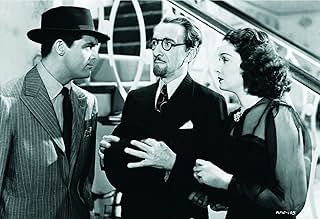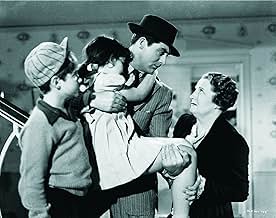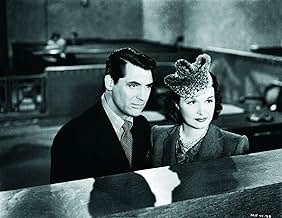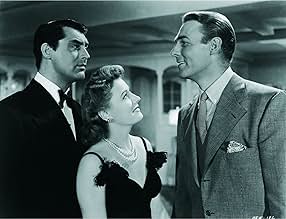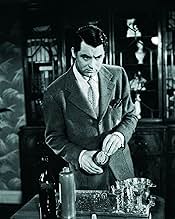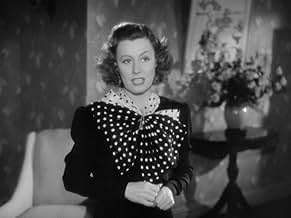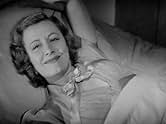AVALIAÇÃO DA IMDb
7,2/10
12 mil
SUA AVALIAÇÃO
Desaparecida há sete anos e supostamente morta, uma mulher volta para casa no dia do segundo casamento do marido.Desaparecida há sete anos e supostamente morta, uma mulher volta para casa no dia do segundo casamento do marido.Desaparecida há sete anos e supostamente morta, uma mulher volta para casa no dia do segundo casamento do marido.
- Direção
- Roteiristas
- Artistas
- Indicado a 3 Oscars
- 3 vitórias e 3 indicações no total
Jean Acker
- Postponed Case Witness
- (não creditado)
Murray Alper
- Yosemite Bartender
- (não creditado)
Leon Belasco
- Waiter - Pacific Club Poolside
- (não creditado)
Joe Cabrillas
- Phillip
- (não creditado)
Bill Cartledge
- Page Boy Paging Burkett
- (não creditado)
Chester Clute
- Shoe Salesman
- (não creditado)
Corky
- Corky the Dog
- (não creditado)
Avaliações em destaque
...albeit a little slow-paced in the first half. Leo McCarey's chaotic pace which made The Awful Truth so much fun is missed here, but Garson Kanin directs capably in his absence and the script and actors deliver enough good wit and chemistry to keep it all balanced out in the end.
Cary Grant gets himself into an unwitting romantic pickle when he's confronted by his thought to be long dead wife on his honeymoon with his new bride. Hilarity ensues, as it does in every brilliant screwball comedy Grant was the star of, and there are some priceless moments along the way.
As in The Awful Truth, Grant and Irene Dunne make a fetching and compatible screen couple. Dunne's comedic felinity and tendency to affect nutty stereotypes in order to get what she wants is better than Katharine Hepburn's imitation of her in Bringing Up Baby and The Philadelphia Story. Grant and Hepburn were terrific in their movies together too, and not taking anything away from Great Kate, but Grant and Dunne's chemistry was just that much better and it's a shame they never made more comedies together.
Hilarious in-jokey scenes between Grant and Randolph Scott, and a near scene stealing turn by Granville Bates as The Judge round out a pretty funny flick.
The Doris Day/James Garner remake "Move Over, Darling" is memorable in its own right and viewed right after this would make for a good video double-bill.
Cary Grant gets himself into an unwitting romantic pickle when he's confronted by his thought to be long dead wife on his honeymoon with his new bride. Hilarity ensues, as it does in every brilliant screwball comedy Grant was the star of, and there are some priceless moments along the way.
As in The Awful Truth, Grant and Irene Dunne make a fetching and compatible screen couple. Dunne's comedic felinity and tendency to affect nutty stereotypes in order to get what she wants is better than Katharine Hepburn's imitation of her in Bringing Up Baby and The Philadelphia Story. Grant and Hepburn were terrific in their movies together too, and not taking anything away from Great Kate, but Grant and Dunne's chemistry was just that much better and it's a shame they never made more comedies together.
Hilarious in-jokey scenes between Grant and Randolph Scott, and a near scene stealing turn by Granville Bates as The Judge round out a pretty funny flick.
The Doris Day/James Garner remake "Move Over, Darling" is memorable in its own right and viewed right after this would make for a good video double-bill.
From the opening moments, when the big wooden doors part and usher us into a beautifully spare art deco courtroom with slanting shafts of sunlight enhancing the clean architectural lines, we know that this is going to be a deftly-made, elegant film. What follows does not disappoint us.
Attorney Nick Arden (Cary Grant) lost his wife Ellen in a shipwreck in the Pacific seven years ago. He has now decided to have her declared officially dead, so that he will be free to marry Bianca (Gail Patrick). The irascible judge eventually accedes to both the declaration and the marriage, and the newly-weds set off for a honeymoon in Yosemite. Meanwhile, who should turn up at the Arden residence, very much alive, but the long-lost Ellen? When she hears of the recent marriage, she heads straight for the honeymooners' hotel ...
"My Favourite Wife" is a fine example of those early Cary Grant farces, the ones in which he gawps with surprise, double-takes and mutters to himself as only he can. Irene smoke-gets-in-your-eyes Dunn is great as Ellen, unveiling a hitherto unsuspected gift for witty comedy. Scotty Beckett and Mary Lou Harrington come close to stealing the show as the Ardens' cute little kids. Randolph Scott is interestingly cast as Steve Burkett, the muscle-bound Adonis who spent seven years on the desert island with Ellen.
Some of the film's highlights are worth mentioning here, like the superimposition of Burkett performing gymnastic feats alongside Nick Arden's troubled face as he muses at his desk, conveying with economy the husband's jealous preoccupation. It is unfair to give away a film's jokes, but one gag which lose nothing in the telling is Ellen's outfit at the Yosemite hotel. She has been out of circulation for seven years, and she looks comically untrendy in her 1932 polkadots and lapels, and obtrusive hat. Watch for the derisive glances from the other hotel guests.
Such a light, charming piece of entertainment is hard to fault, but the film does have some shortcomings. Its central problem, which is not resolved, is what to do with Bianca. She married Nick in good faith and has done nothing wrong, yet she is neglected by Nick. Because there is no satisfactory way of dealing with her, she is simply dropped. Ellen's return from a watery grave after all those years would be a news story of international importance, but instead she arrives home having hitched a ride in a truck. Her entry into the country seems to have gone unannounced, even to her husband. The scene in which she persuades a shoe store clerk to pose as 'Adam' in front of Nick has enormous comic potential, but is abandoned after a few seconds. Nick's sleeping-in-the-attic scene is far too long for the humour it contains.
However, the film is a pleasant and very amusing romp, and such weaknesses as it contains do not detract from its appeal.
Attorney Nick Arden (Cary Grant) lost his wife Ellen in a shipwreck in the Pacific seven years ago. He has now decided to have her declared officially dead, so that he will be free to marry Bianca (Gail Patrick). The irascible judge eventually accedes to both the declaration and the marriage, and the newly-weds set off for a honeymoon in Yosemite. Meanwhile, who should turn up at the Arden residence, very much alive, but the long-lost Ellen? When she hears of the recent marriage, she heads straight for the honeymooners' hotel ...
"My Favourite Wife" is a fine example of those early Cary Grant farces, the ones in which he gawps with surprise, double-takes and mutters to himself as only he can. Irene smoke-gets-in-your-eyes Dunn is great as Ellen, unveiling a hitherto unsuspected gift for witty comedy. Scotty Beckett and Mary Lou Harrington come close to stealing the show as the Ardens' cute little kids. Randolph Scott is interestingly cast as Steve Burkett, the muscle-bound Adonis who spent seven years on the desert island with Ellen.
Some of the film's highlights are worth mentioning here, like the superimposition of Burkett performing gymnastic feats alongside Nick Arden's troubled face as he muses at his desk, conveying with economy the husband's jealous preoccupation. It is unfair to give away a film's jokes, but one gag which lose nothing in the telling is Ellen's outfit at the Yosemite hotel. She has been out of circulation for seven years, and she looks comically untrendy in her 1932 polkadots and lapels, and obtrusive hat. Watch for the derisive glances from the other hotel guests.
Such a light, charming piece of entertainment is hard to fault, but the film does have some shortcomings. Its central problem, which is not resolved, is what to do with Bianca. She married Nick in good faith and has done nothing wrong, yet she is neglected by Nick. Because there is no satisfactory way of dealing with her, she is simply dropped. Ellen's return from a watery grave after all those years would be a news story of international importance, but instead she arrives home having hitched a ride in a truck. Her entry into the country seems to have gone unannounced, even to her husband. The scene in which she persuades a shoe store clerk to pose as 'Adam' in front of Nick has enormous comic potential, but is abandoned after a few seconds. Nick's sleeping-in-the-attic scene is far too long for the humour it contains.
However, the film is a pleasant and very amusing romp, and such weaknesses as it contains do not detract from its appeal.
There are some lovely, touching and dryly amusing scenes in this film. Kanin and the scriptwriters manage to form a substantive, if occasionally gossamer light, whole out of the playing of fine leads and canny comic incidents. The basic story may be the oldest of chestnuts, but it is here embellished with some degree of incisiveness. Grant's scene by the pool with Dunne and Scott reaches a fine pitch of hilarity, and who can forget the impressionistic scene of Scott's diving coming into Grant's mind and being presented in miniature on-screen?
That master player of light, witty material, Grant, is of course sublime, and I was surprised by Irene Dunne - who I had never previously seen in a lead film role. She was magnificently feline, as Pauline Kael says; dispensing slinky, fluttering phrases and quips, and making it clear what a laugh the character is having; she seems rather to be getting off on the entangled situation. The speech patterns are drolly created by Dunne; wonderful Southern hamming, or archetypal screwball dame quick-talk... Her warming, gadding-about voice is charms, along with deft facial acting; look at the "Oh Bianca..." scene at the hotel early on, where she sensuously reclines on a settee and gets Grant to pretend he is entering the room and kissing his new wife. Minxish mischief of the most heartwarming kind, aye...!
Remarkable to think that Ms. Dunne was over forty when this was made. She has the bearing of many years younger and conveys an impressive vigour. One takes to her unconventional good looks; her slight awkwardness as a 'star' is amusingly alluded to, under the surface, in her son's dialogue late on; very poignant little moment, that. Like Rosalind Russell and Kate Hepburn, she is no textbook beauty, and it is her characterful playing conveys a winking, winning attractiveness. Why is it that we have so few similarly idiosyncratic actresses around today? All - or rather much - has to be homogenised; pop star product looks are apparently required, and conveyor-belted into mainstream films. Film is missing the enticing depths of real-life when it opts for the conformist teenage boy's supposed 'dream woman' - mass-media-fostered - over a greater variety of people and appearances, as one encounters in actual reality.
The actor playing the world-weary, rather Robb Wilton-esquire magistrate ought to have been involved more than he was; an enjoyable turn, that would have been effectively woven deeper into the narrative. Randolph Scott amused slightly too, in his support role; a worthy foil. Things did perhaps get rather sentimental with the involvement of the couple's children, although this is hardly the worst such offender in Hollywood history. The insidious wryness seems completely blunted by the end, when the couple are finally reconciled. One may be charmed by the actors' performances, but it all starts to seem a bit indulgent, and the feeling grows that chances were missed.
But really, one must be indulgent, critically; there is priceless stuff in this film's fibre, and while it fires not on all screwball-comedy cylinders, it is a very pleasant feature with glorious screen presences making (deceptively) light of life.
That master player of light, witty material, Grant, is of course sublime, and I was surprised by Irene Dunne - who I had never previously seen in a lead film role. She was magnificently feline, as Pauline Kael says; dispensing slinky, fluttering phrases and quips, and making it clear what a laugh the character is having; she seems rather to be getting off on the entangled situation. The speech patterns are drolly created by Dunne; wonderful Southern hamming, or archetypal screwball dame quick-talk... Her warming, gadding-about voice is charms, along with deft facial acting; look at the "Oh Bianca..." scene at the hotel early on, where she sensuously reclines on a settee and gets Grant to pretend he is entering the room and kissing his new wife. Minxish mischief of the most heartwarming kind, aye...!
Remarkable to think that Ms. Dunne was over forty when this was made. She has the bearing of many years younger and conveys an impressive vigour. One takes to her unconventional good looks; her slight awkwardness as a 'star' is amusingly alluded to, under the surface, in her son's dialogue late on; very poignant little moment, that. Like Rosalind Russell and Kate Hepburn, she is no textbook beauty, and it is her characterful playing conveys a winking, winning attractiveness. Why is it that we have so few similarly idiosyncratic actresses around today? All - or rather much - has to be homogenised; pop star product looks are apparently required, and conveyor-belted into mainstream films. Film is missing the enticing depths of real-life when it opts for the conformist teenage boy's supposed 'dream woman' - mass-media-fostered - over a greater variety of people and appearances, as one encounters in actual reality.
The actor playing the world-weary, rather Robb Wilton-esquire magistrate ought to have been involved more than he was; an enjoyable turn, that would have been effectively woven deeper into the narrative. Randolph Scott amused slightly too, in his support role; a worthy foil. Things did perhaps get rather sentimental with the involvement of the couple's children, although this is hardly the worst such offender in Hollywood history. The insidious wryness seems completely blunted by the end, when the couple are finally reconciled. One may be charmed by the actors' performances, but it all starts to seem a bit indulgent, and the feeling grows that chances were missed.
But really, one must be indulgent, critically; there is priceless stuff in this film's fibre, and while it fires not on all screwball-comedy cylinders, it is a very pleasant feature with glorious screen presences making (deceptively) light of life.
I agree that Move Over Darling is a very good remake of My Favorite Wife, but Doris Day and James Garner, much as I like them, cannot reach the level of sophistication of Grant/Dunne. Randolph Scott does nothing to detract from the picture. Certainly no more than Chuck Connors does in the same role in Move Over Darling. The courtroom scenes with Grant and Granville Bates as the judge are superior, and Donald McBride as the hotel clerk is exceptional. Cary Grant's facial expression on the elevator when he first sees Dunne after 7 years is so memorable that I can still remember it 35 years after first seeing it. If you are a Grant fan, you have to see this movie.
This is not my favourite screwball comedy of all time or anything, but I did really enjoy it. It is compared to The Awful Truth, and I will say I do prefer The Awful Truth, and while people may find this blasphemous I preferred 1963's Move Over Darling too.
Where the film doesn't quite succeed is that it felt a little too short, the film's end takes a little too long and felt misplaced and there are some moments in the middle where the film drags a bit.
However, it looks good, is well directed, is well scored, while the story is great, the screenplay a lot of fun and the performances from Irene Dunne, Gail Patrick and especially Cary Grant are fun. In terms of casting, the only weak link is Randolph Scott, not that he was terrible or anything but he is very underused seeing his role feels I agree more of a cameo than a fully-fleshed out character. So overall, good but not great, worth seeing for Grant. 6.5/10 Bethany Cox
Where the film doesn't quite succeed is that it felt a little too short, the film's end takes a little too long and felt misplaced and there are some moments in the middle where the film drags a bit.
However, it looks good, is well directed, is well scored, while the story is great, the screenplay a lot of fun and the performances from Irene Dunne, Gail Patrick and especially Cary Grant are fun. In terms of casting, the only weak link is Randolph Scott, not that he was terrible or anything but he is very underused seeing his role feels I agree more of a cameo than a fully-fleshed out character. So overall, good but not great, worth seeing for Grant. 6.5/10 Bethany Cox
Você sabia?
- CuriosidadesCary Grant and Randolph Scott, who play rivals in this film, lived together on and off between 1932 and 1944.
- Erros de gravaçãoWhen Ellen has her first hot shower in seven years, she wears a bathing cap rather than washing her hair in the shower.
- Citações
Nick Arden: I came here with my wife... hum... my bride really. Now my wife, not my bride... my wife... Why should I bore you with details?
Hotel clerk: I won't be bored.
Nick Arden: Listen, it's just simple as A B C.
Hotel clerk: Don't tell me you got someone in B?
- Cenas durante ou pós-créditosRather than the normal "The End" title as the movie concludes, "Good Night" is drawn in cursive handwriting.
- ConexõesEdited into Marilyn: Something's Got to Give (1990)
- Trilhas sonorasJingle Bells
(1857) (uncredited)
Written by James Pierpont
Played as part of the score when Cary Grant dons his Santa Claus costume
Principais escolhas
Faça login para avaliar e ver a lista de recomendações personalizadas
Everything New on HBO Max in August
Everything New on HBO Max in August
Looking for something different to add to your Watchlist? Take a peek at what movies and TV shows are coming to HBO Max this month.
- How long is My Favorite Wife?Fornecido pela Alexa
Detalhes
- Data de lançamento
- País de origem
- Idioma
- Também conhecido como
- Mi mujer favorita
- Locações de filme
- Empresa de produção
- Consulte mais créditos da empresa na IMDbPro
- Tempo de duração
- 1 h 28 min(88 min)
- Cor
- Proporção
- 1.37 : 1
Contribua para esta página
Sugerir uma alteração ou adicionar conteúdo ausente


